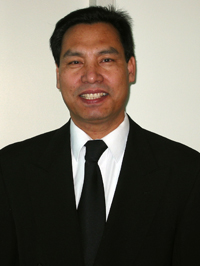 |
Yuri Persidsky, M.D., Ph.D. |
 |
James Haorah, Ph.D. |
Epidemiologic studies suggest that alcohol use may be a risk factor for more pronounced cognitive decline in individuals with HIV-1, the most common strain of the disease.
UNMC’s Yuri Persidsky, M.D., Ph.D., and James Haorah, Ph.D., are exploring the hypothesis that this cognitive decline is caused by dysfunction of certain cells that support neuronal function — a dysfunction that is commonly seen in cases combining HIV-1 and alcohol use.
“Alcohol is abused by nearly 14 million Americans and has lasting toxic effects on the brain,” said Dr. Persidsky, a professor in the departments of pathology and microbiology, and pharmacology and experimental neuroscience. “HIV-1 also is known for its cognitive effects on the brain. How the damage from the two combined is currently unknown but we hope to change that.
“Neuroimaging studies demonstrate more significant regional abnormalities, indicating neuronal loss, in HIV-1 positive alcohol abusers, as compared to non-infected alcoholics.”
The five-year grant will allow Dr. Persidsky, who investigates the blood brain barrier abnormalities seen in HIV brain infection and neuroinflammation, to team up with Dr. Haorah, who has been studying the effects of alcohol abuse on the brain and the blood brain barrier since 2003.
Dr. Haorah, an assistant professor in the UNMC Department of Pharmacology and Experimental Neuroscience, is interested in the mitochondrial dysfunction and oxidative stress as the causes of alcohol-induced brain injury.
Data obtained by Drs. Haorah and Persidsky so far indicate that alcohol exposure promotes production of inflammatory molecules in different brain cells causing neuronal injury.
As HIV brain infection elicits similar effects, alcohol abuse is a major risk factor for neurocognitive impairment in HIV-infected persons.
Dr. Haorah has a personal motivation for doing these studies.
Born in the northeastern part of India, Dr. Haorah grew up in the Naga tribe, which is battling an epidemic of alcoholism and, in recent times, HIV/AIDS infection.
“Thousands of people in my tribe suffer from alcoholism, similar to the way the Native Americans in the United States suffer from it,” he said.
It is hoped that these studies will lead to new neuroprotective therapeutic interventions, Dr. Persidsky said.